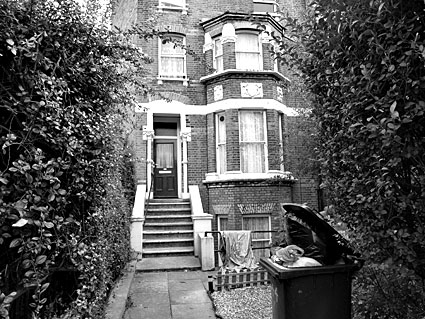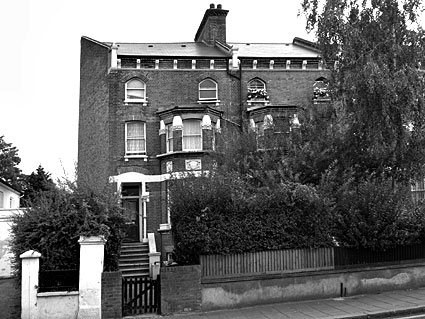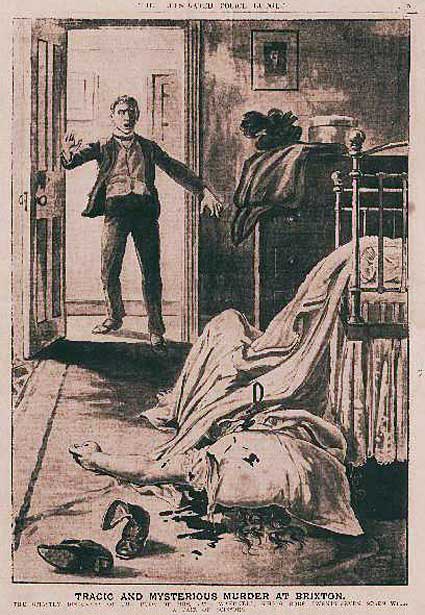MURDER IN BRIXTON, May 1900
A mysterious murder in Brixton Water Lane, London, SW9
THE TIMES Monday 14th May 1900
MURDER AT BRIXTON.
One of those mysterious murders which now and again shock London came to light at Brixton on Saturday morning.
For some time past Mrs. Mary Kate Waknell, a middle-aged woman living apart from her husband, and a lad of 16 years named Robert Burgess, her son by a former marriage, have occupied apartments in a house in Water Lane, Brixton, a thoroughfare in close proximity to the main Brixton-road.
The house, which is in the occupation of several families, stands back from the road and is approached by a long forecourt. There is a separate entrance to the basement rooms occupied by Mrs. Waknell and her son.
So far as can be ascertained Mrs. Waknell went out about 11 o'clock on Friday night and returned soon after midnight, it is believed, alone.
Nothing occurred during the night to attract the attention of the other occupants of the house, and it was not until the boy Burgess (who slept in the back basement room) arose on Saturday morning and went into his mother's apartment that it was found a murder had been committed.

The woman, clothed only in her night attire, was found lying on the floor in a pool of blood and with a pillow over her face. There was a horrible gash in her throat, and an exceedingly sharp pair of scissors was found embedded in her left breast in the region of the heart.
It is said that there were also stabs about other part of the body. There were no signs of a struggle, the contents of the room being undisturbed, but it is significant that the front door was found open. The scissors were the property of the woman, and were used by her in her trade as a mantle maker.
The medical man who was called in had difficulty in deciding that it was impossible for the wounds to have been self-inflicted.
The police are making all possible inquiries, but the assailant left not a single vestige of evidence which could be followed up, and the officers engaged in the case freely confess that they are without a clue. The inquest in fixed for to-day.

THE TIMES
Tuesday 15th May 1900
THE MURDER AT BRIXTON
Mr. G. P. Wyatt, coroner, held an inquest at the Lambeth Coroner's Court yesterday on the body of MARY KATE WAKENELL, aged 42 years, the wife of Arthur Norman Case Wakenell, a shop assistant, who was found murdered at 44, Water Lane, Brixton, on Saturday morning.
Robert Burgess, a son, said that his mother and stepfather separated some five years ago. The witness last saw Wakenell eight or nine weeks ago, when he passed the house on the opposite side of the way and went into the Royal Oak public house.
His mother never met his stepfather, so far as he knew, outside; in fact she did not want Wakenell to know where she lived. His mother got her living by mantlemaking, but had not done much the last few weeks.

The witness and his mother occupied two rooms in the basement at 44, Water Lane, for which they paid 7s. per week. His mother slept in the front room, and the witness in the kitchen at the back.
When he returned home from work shortly after 10 o'clock last Friday night his mother, who appeared as usual, was dressing to go out.
He gave her some money, and about half an hour later she left the house. She frequently went out at nights and drunk a little too much at times. He went to bed soon alter she had left, and did not hear her return.

At a quarter to 8 o'clock on Saturday morning he went into his mother's room and found her lying on the floor in her nightdress with a pillow over her face. He removed the pillow, thinking she was in a fit, and then saw a quantity of blood about her. He immediately called down the landlady.
There was a passage from his mother's room door to the area door leading to the street, and this was wide open when he went for medical assistance. His mother usually locked it when she came in at night. He identified the scissors produced as belonging to his mother.
Harriett Ada Burgess, a daughter of the deceased woman, stated that her stepfather was employed by Messrs. Parking and Gotto for some 14 years. He married her mother on September 3, 1892.
Her mother subsequently succeeded to some money, and he then left his situation and lived upon her. If she would not give him money to get drink he used to strike her. The witness was under the impression that her mother had met him about nine months ago at Camberwell.
Dr. J. F. Fielder, of 12, Water Lane, stated that he was called in and found the woman lying on her back with her legs drawn up.
There was a cut wound on the neck 3 � in. long. On the left side of the body near the upper border of the fourth rib, close to the armpit, was inserted one blade of a pair of tailors' scissors. The right eyelid was blackened as from a blow of considerable violence. Death had occurred some four hours previous to his arrival.

He subsequently made a post mortem examination of the body. There had been at least six attempts to cut the throat. There were seven stab wounds which lead punctured the liver, and another had penetrated the right ventricle of the heart.
The spleen was also punctured, and there were other minor wounds about the body. The wounds were V-shaped. He could not say whether the injuries were inflicted by a right or left handed man.
It was impossible for the wounds to be self-inflicted. The scissors produced were capable of inflicting all the injuries. In his opinion the blow she received over the right eye would be sufficient to stun her and prevent her from screaming.
Inspector D. O'Sullivan, of the W Division, stated that he was called and examined the room, but found no signs of a struggle. The police were instituting inquiries into the affair.
Police-constable Crayford, 141 W, stated that he had known the woman by sight for about four mouths. He last saw her shortly after midnight on Friday; she was then in the Effra Road, going towards Water Lane.
She appeared quite sober. He had seen her out late at night with different men.
The jury returned a verdict of "Wilful murder against some person or persons unknown.

THE ILLUSTRATED POLICE BUDGET
Saturday 19th May 1900
TRAGIC AND MYSTERIOUS MURDER AT BRIXTON.
The Ghastly Discovery of the Body of Mrs. Kate Wakenell, which bore Twenty-seven stabs with a pair of Scissors.
A MURDER peculiarly brutal and mysterious, for which no motive can at present be definitely assigned, was committed early on Saturday morning at 44, Water Lane, Brixton.
The victim was Mary Kate Wakenell, a married woman, 42 years of age, who had been for some time separated from her husband.
Mrs. Wakenell occupied, with her son, a lad of sixteen, a set of small rooms in the basement of the building.
Her landlady, with whom she seldom came in contact, knew little of her movements, and supposed her to be a mantle-maker. She kept late hours, frequently returning to the rooms after midnight. Generally, however, she was a quiet tenant. The son is a respectable lad in regular employment.
About twelve o'clock on Friday night Mrs. Wakenell went out saying, saying she would soon return. She was last seen alive in Effra Road, Brixton, shortly after midnight.


The murder was discovered by her son at eight o'clock on Saturday morning. Her body, almost nude, lay on the floor, and a pillow, which had apparently been used to smother her cries, was pressed on her face. There were no fewer than twenty-seven wounds on the body, and a pair of scissors with which she had been stabbed to the heart was still in her breast.
The strangest feature of the crime is that most of the wounds appear to have been inflicted before the fatal stab in the breast. But no trace of a struggle has been found in the room, nor did Mrs. Wakenell's son, who slept in an adjoining room, hear any disturbance during the night.
The murderer is supposed to have returned to the house with Mrs. Wakenell about one or two o'clock, and to have gone quietly out through the door after killing her. The woman is known to have had a small sum of money on Friday night, but none of it has been found in her room.
She and her husband had frequently quarrelled prior to their separation, and he had been before the court for assaulting and threatening her. He is described as a stationer's traveller, about forty years of age.
THE INQUEST
Mr. G.P. Wyatt, the Coroner for the Southern District, opened the inquiry into the circumstances of the woman's death to-day.
A boy with a blank dead wall of a face lumbered heavily into the witness box.
He was Robert W. Burgess, the son, who on going into the front room in the early morning, stumbled over the corpse of his mother lying in her nightdress behind the connecting door, between the bed and the door that led from the front room to the passage.
With many a halt and stumble he told how his mother "sometimes did mantle-making, but not often;" how, in spite of the fact that she did little or no work, she was able to pay the rent and provide him with food; and how he last saw her alive at ten minutes to eleven on Friday night, when she went out showily dressed, saying that he was to sleep, and not stir from the next room.

"She often went out at that hour nearly every night," he added, and his head drooped. "That was the last time I saw her alive." At this juncture a post-card, received by the deceased woman and found in her room at the time of the discovery of her body, was handed by the coroner to the witness.
Yes he recognised the postal-card. He had seen it in her room on Friday. This card, which is more than likely to have an important bearing on the result of the investigation, told of rooms in Lime Street, Brixton, engaged by the writer for Mrs. Waknell, was signed, "With you last night."
The date on the postcard (Friday) made it clear that the writer had been in Mrs. Waknell's company twenty-four hours before the murder. Harriet Burgess, the daughter of the dead woman, told briefly of the relations that that had existed between her mother and step-father.
For five years Mr. Waknell had lived with her mother, occupying the position of a shop-walker, and had continued in work until her mother inherited money, when he gave up his situation. "Constantly quarrelling" was the witness' reason of the cause of the final separation.
"Was Waknell left-handed?" said Mr. Wyatt, breaking in upon Miss Burgess' graphic account of a domestic fight between Waknell and her mother. The significance of the coroner's question is evident in view of the fact that the wound in the throat runs from left to right, and had therefore been inflicted with the right hand, a circumstance which would support a theory of suicide.
Miss Burgess replied, "I often saw him strike my mother, but I cannot say that he was not left-handed."
And the jury by their questions supported the girl in her inferential suggestions against Waknell, blissfully unaware that he had already surrendered himself to the police and fully and satisfactorily accounted for his movements at the time of the murder.
The evidence given by Dr. Frederick Fielder completely disposed of any lingering theory of suicide. "The wound in the heart, which was the fatal wound," he said, "could not have been self-inflicted."
Finally, Cornelius Crayford, a police-constable, swore that he had met the deceased in the Effra Road going in the direction of her home. "Generally she had a man with her," said the policeman. "This time she was alone and sober." "Murdered by some person or persons unknown." said the jury, and thus for the present the case stands.
The Police on Monday arrested a man on suspicion of being connected with the tragedy. The outside of his shirt-cuffs -- especially the right one -- it is stated, bore bloodstains, and there was blood on his night-shirt and the sheets of his bed.
It is stated that the man arrested is known to have been intimately acquainted with Mrs. Waknell.
« See Brixton Water Lane photos
« Brixton features home
|
|

